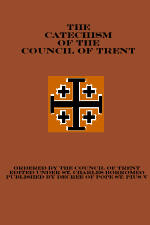
The Catechism Of The Council Of Trent
CHAPTER I
ON FAITH AND THE SYMBOL OF FAITH
QUESTION I
What is meant by Faith in this place, and of its Necessity unto Salvation
But whereas in Sacred Scripture the word faith has a variety of meanings, we here speak of that faith, by force of which we yield our entire assent to whatever has been divinely delivered. And that this faith is necessary to obtaining salvation, no man can reasonably doubt, particularly as it is written, that without faith it is impossible to please God. For whereas the end proposed to man as his ultimate happiness is far beyond the reach of the human understanding, it was therefore necessary that he should receive the knowledge thereof from Almighty God. And this knowledge is nothing else than faith, by virtue of which we hold that as fixed whatsoever the authority of our Holy Mother the Church teaches us to have been delivered by God; for the faithful can have no doubt touching those things of which God, who is the truth itself, is the author. Hence we understand how great is the difference that exists between this faith which we have in God, and that which we yield to the writers of human history. But faith, though comprehensive in its meaning, and differing in degree and dignity (for we read in the sacred writings these words—O thou of little faith, why didst thou doubt? and, Great is thy faith; and, Increase our faith; also, Faith without works is dead; and, Faith which worketh by charity), is yet the same in kind; and the force and nature of its definition applies equally to all its degrees. Its fruitfulness, and the advantages we may derive from it, will be pointed out in the explanation of the articles [of the Creed].
QUESTION II
When, and for what Reason, the Twelve Heads of Faith were handed down by the Apostles
The first points, then, which Christian men ought to hold, are those which the holy apostles, the great leaders and teachers of the faith, inspired by the Holy Ghost, have divided into the twelve articles of the Creed. For when they had received a command from the Lord to go forth into the whole world, acting as his ambassadors, and preach the Gospel to every creature, they thought fit to compose a form of Christian faith, to wit, that all might think and speak the same thing, and that amongst those whom they should have called unto the unity of faith no schisms should exist, but that they should be perfect in the same mind, and in the same judgment.
QUESTION III
Why this was called a “Symbol”
This profession of Christian faith and hope, composed by themselves, the apostles called a symbol, either because it was made up of various sentences, which each contributed respectively towards its completion, or because by it, as by a common sign and watchword, they might easily distinguish false brethren, deserters from the faith, unawares brought in, who corrupted the word of God, from those who had really bound themselves by an oath of fidelity to the warfare of Christ.
QUESTION IV
Of the Necessity of this Creed, and its Division into Parts
Amongst the many truths which are proposed to our belief in the Christian religion, and of which, separately or generally, a certain and firm faith ought to be held, the first, and one which is necessary to be believed by all, is that which God himself has taught us as the foundation and summary of truth, which regards the unity of the Divine Essence, and the distinction of the Three Persons, and the actions which are in some sort peculiarly attributed to each. The pastor will teach that the Apostles’ Creed briefly comprehends the doctrine of this mystery.
For, as our ancestors have observed, who, in treating this subject, have shown both piety and accuracy, [the Creed] seems to be divided into three principal parts, in suchwise, that one describes the first person of the Divine Nature, and the marvellous work of creation; another, the second person, and the mystery of man’s redemption; a third, comprising the doctrine of the third person, the origin and source of our sanctification, in divers and most appropriate sentences. Now these sentences we call articles, by a sort of comparison frequently used by our forefathers; for as the members of the body are divided by joints (articuli), so also, in this profession of faith, whatever is to be believed distinctly and separately from anything else, is properly and appositely called an article.
Copyright ©1999-2023 Wildfire Fellowship, Inc all rights reserved

 Keep Site Running
Keep Site Running